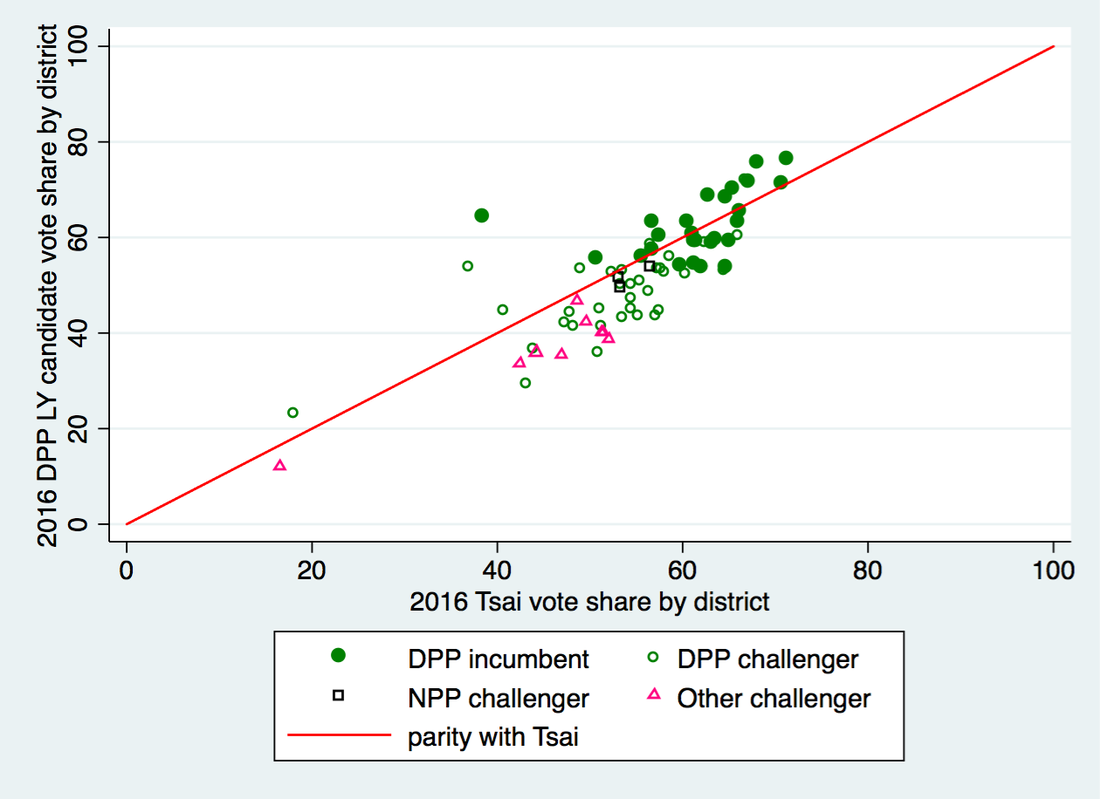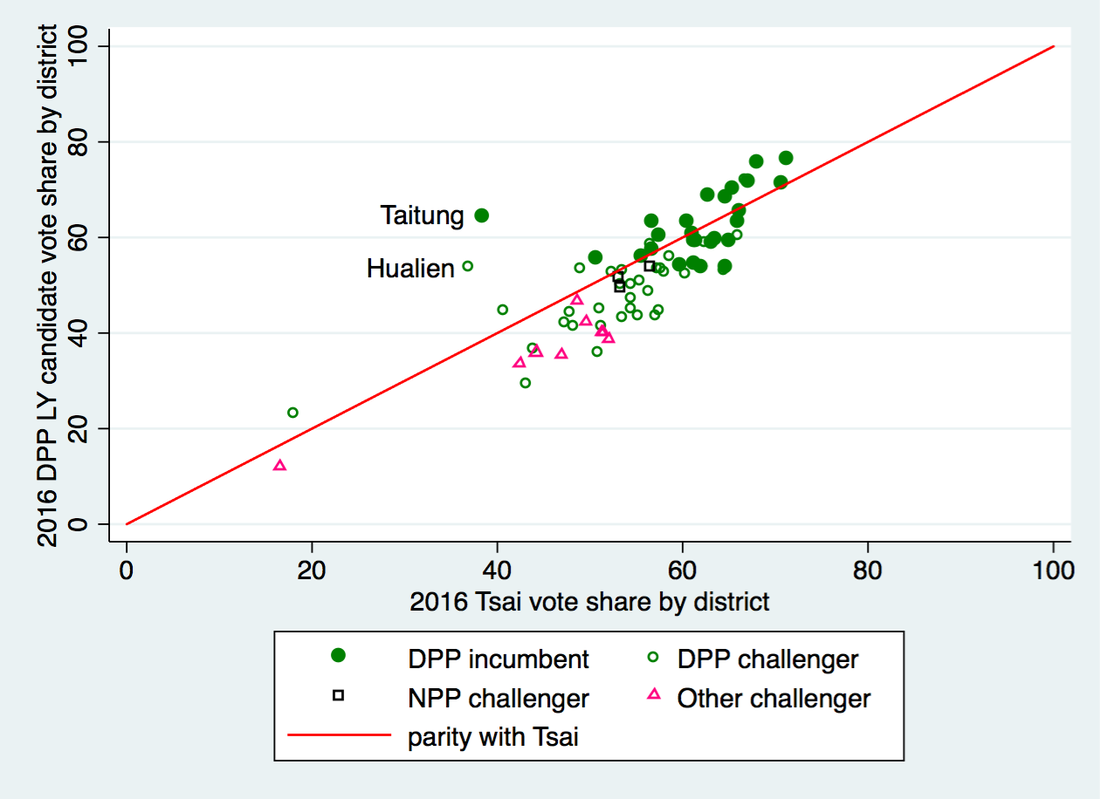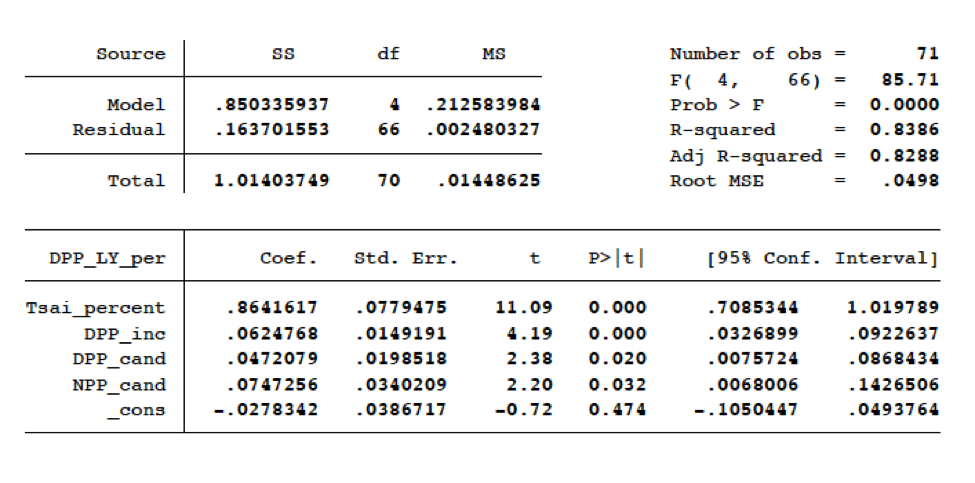One of the more interesting developments in Taiwan's 2016 general election was the rise of so-called "Third Force" parties--completely new entrants into the political system, rather than break-aways from the KMT or the DPP. While some of the media commentary got a bit carried away about the significance of these new parties, the founding of one, the New Power Party (NPP), did pose a serious threat to the DPP's chances of winning a majority in the legislature. As an offshoot of the Sunflower Movement, the NPP positioned its message in a way calculated to appeal to pan-green voters, and it recruited high-profile candidates to run in district races, not just the party list. These district candidates had the potential to split the pan-green vote in what everyone expected would be a very anti-KMT year, and in a worst-case scenario for their side, help the KMT hold on to their legislative majority.
In the end, a pan-green split didn't happen. A key reason is that the DPP headed off the threat early: the party formed a kind of pre-electoral coalition by yielding 11 districts to the NPP and other non-DPP candidates in exchange for their support not to run against DPP candidates elsewhere. And the districts that the DPP yielded were, with one exception, far past the critical 57th seat needed to deliver a legislative majority. It turned out to be a good deal for the DPP, which won 68 seats overall. It also, more surprisingly, turned out well for the NPP, which won all three district seats and five overall and became the third largest party in the LY.
My own expectation going into the election was that the NPP candidates would perform worse, on average, than a generic DPP challenger. (In fact, if you read that linked post closely, I was even more specific: 2-4 points worse, on average.) The rationale was pretty simple: Freddy Lim, Hung Tzu-yung, and Huang Kuo-chang were already household names, but their close association with the Sunflower Movement, and the acerbic rhetoric of Huang, especially, suggested they would be fairly polarizing as candidates. And in the traditionally blue-leaning districts of Taipei 5 (Lim) and New Taipei 12 (Huang), I thought they would turn off more voters than they attracted with that approach.
So what actually happened? In the graph above, I've plotted the vote share of each DPP and DPP-endorsed district candidate against Tsai Ing-wen's share of the presidential vote in the same district. DPP incumbents are represented by solid dots; challengers (i.e. non-incumbents) by hollow ones; NPP candidates by hollow squares, and other non-DPP candidates by hollow triangles. (A hearty thank you to Frozen Garlic for doing the yeoman's work of sorting the presidential race vote totals by LY district and making these data publicly available.)
Thoughts on this below the break.
- The NPP challengers did better than the other non-DPP candidates. All three* ran close to the presidential ticket: Hung ended up short of Tsai's district vote-share by 2.6%, Lim by 3.9%, and Huang by only 1.6%. To put this in perspective, across the entire set of DPP and DPP-endorsed candidates, the average deficit was 3.2%. (*Note that the fourth NPP candidate, Chiu Hsien-chih in Hsinchu City, isn't included here because he wasn't endorsed by the DPP, although he still ran a campaign against the DPP nominee Ker Chien-ming.)
- The non-DPP, non-NPP challengers were not great, Bob. These included high-profile candidates like Huang Shan-shan (黃珊珊) of the PFP in Taipei 4, Fan Yun (范雲) of the Social Democratic Party in Taipei 6, and Liu Kuo-lung (劉國隆) of the TSU in Taichung 5, all of whom ran over 11% behind Tsai! In fact, Tsai won a majority of the vote in both Taipei 4 and Taichung 5, so these were winnable races for the DPP with the right candidate. Ultimately, the DPP may have left some seats on the table by yielding these districts to small parties and independents, although in the larger scheme of things it was still probably worth it--after all, the party still won a majority!
- The DPP legislators collectively enjoyed a significant incumbent advantage in 2016. Look at the incumbents versus the challengers. The average vote share for a DPP incumbent was actually 0.7% greater than Tsai's share in the district. The challengers, by contrast, really lagged--a full 5.4% behind the presidential ticket. A lot of them still won, but this graph suggests they won mostly because of the shift in party vote in the district, not because of any special appeal or personal characteristics they might have had. A key electoral concern for the DPP going forward is going to be the degree to which their first-term legislators can build up an incumbent advantage that enables them to run closer to, or even in front of, the presidential ticket, like most of the 2016 incumbents did. The party's ability to hold onto its majority in 2020 may well depend on the answer.
So, contrary to my expectations, New Power Party district candidates not only did better than other non-DPP candidates who were part of the DPP's coalition, they may even have outperformed the average DPP challenger.
Let's go a couple steps further now. First, a bit about the two obvious outliers in the graph above, which I've now labeled: Taitung and Hualien. There's a simple reason these are so far above Tsai's vote share: I've been ignoring the fact that a significant share of the electorate in both of these counties is indigenous, and therefore votes in one of the aborigine constituencies, not the geographic LY district. Since aborigine voters are on the whole much more blue than the electorate as a whole, that means this graph overstates how much DPP candidates in heavily indigenous areas are out-performing the presidential ticket. For a quick and dirty fix, I'm just going to drop Taitung and Hualien from the following analysis. (This is really crude, but it'll do for now.)
Now, let's look at how DPP LY vote share is related to DPP vs NPP nomination, controlling for incumbency advantage and Tsai's district vote share. (Again, very basic linear regression model--no need to do anything fancier here.) Here are the coefficient estimates:
The conclusion is consistent with what's shown in the graph: the NPP's district candidates ran really well, outperforming both other non-DPP candidates and, surprisingly, even DPP candidates.
I'm not sure why the NPP did so much better than all the other DPP-endorsed third party candidates. But one part of the explanation is probably the "star power" of the NPP nominees: Hung, Lim, and Huang already had high name recognition, and they all had distinct personal stories that allowed them to attract even more media attention. They also coordinated their campaigns closely with the Tsai campaign, going so far as to appear together during campaign rallies. Most of the other DPP-endorsed candidates didn't get that kind of support from the top of the DPP ticket.
Another possible explanation is the NPP's close association with the Sunflower Movement. By focusing mostly on their shared antipathy to Ma Ying-jeou, the KMT, and the incumbent party's attempts to build a closer relationship with the PRC, the NPP was reinforcing the DPP's core message. By contrast, the other third-party candidates--particularly the SDP's Fan Yun--sought to emphasize other issues orthogonal to cross-Strait relations, such as labor rights, environmental protection, and free trade. Given how far behind Fan Yun ran, and how poorly the SDP-Greens did in the party list vote, there's little evidence that these issues motivated most voters, even in Taipei.
Instead, the new party system looks a lot like the old party system: all the parties in the legislature can be arrayed along a single dimension based on their approach to cross-Strait relations. Parties that tried to win votes on other issues didn't do well at all. Despite all the talk about the rise of a "Third Force" in Taiwanese politics, there's little evidence in the election results that voters were swayed by appeals orthogonal to cross-Strait relations. Rather, views about Taiwan's relationship with the PRC still seem to be the primary determinant of vote choice. The electorate's views as a whole may have shifted in a green direction, but the issues of disagreement haven't. Plus ça change...



 RSS Feed
RSS Feed
